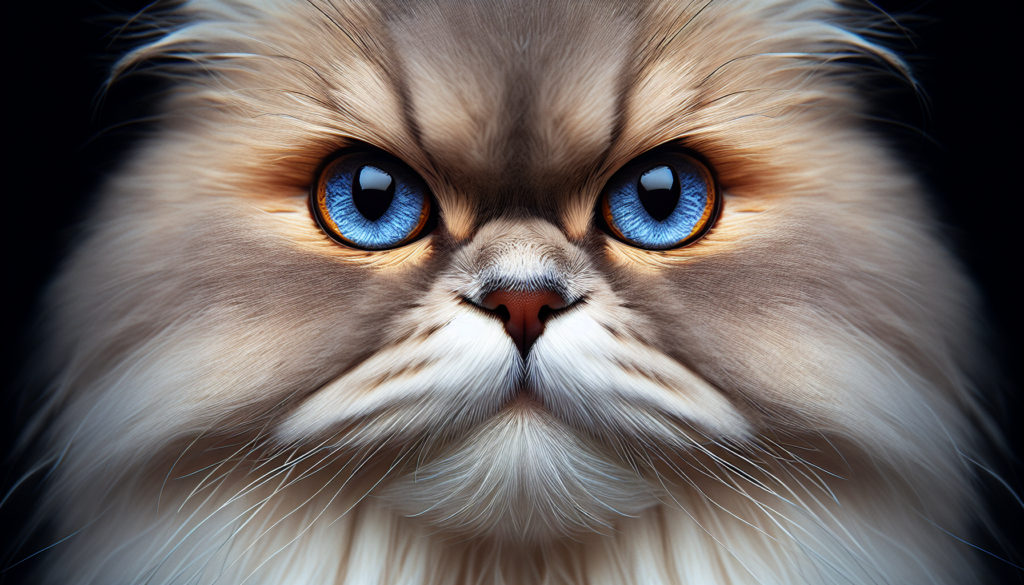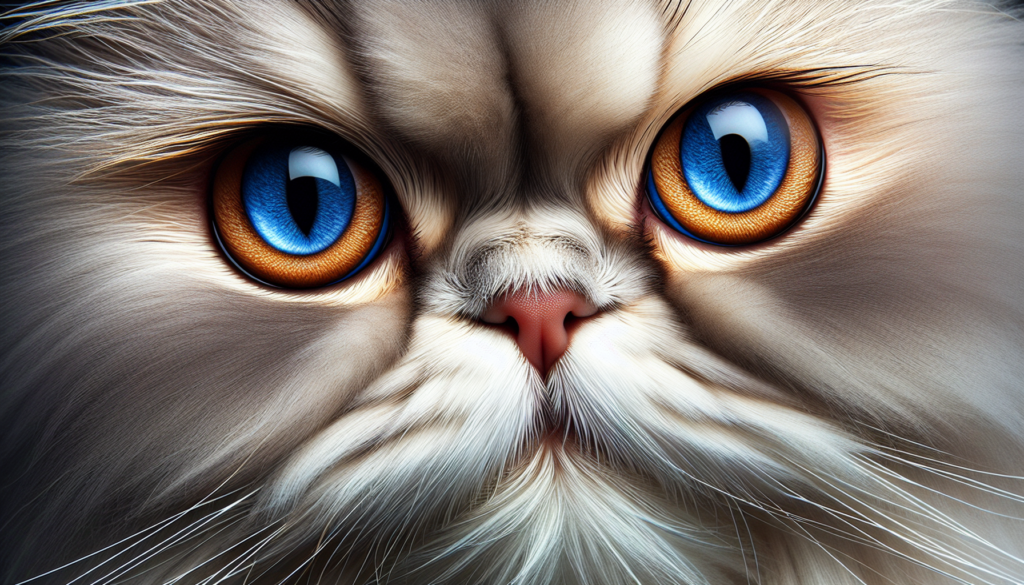Ever wondered why Persians meow so much? It’s no secret that these adorable feline creatures can be quite vocal, but have you ever wondered why they express themselves through endless meows? From their luxurious long fur to their expressive eyes, Persians are undeniably captivating. However, their incessant meowing can leave many curious as to what’s behind their constant communication. In this article, we will explore the reasons why Persians meow so much, unveiling their unique personalities and shedding light on their vocal tendencies. Get ready to discover the secrets behind those charming meows!

The Nature of Persian Cats
Persian cats are well-known for their luxurious coats, charming looks, and unique personalities. They are one of the most popular cat breeds in the world, cherished by many cat lovers for their elegant presence and gentle nature. Understanding the nature of Persian cats is crucial to providing them with the appropriate care, attention, and environment they need to thrive.
Persian Cats as a Popular Breed
Persian cats have been adored and celebrated for centuries, tracing their origins back to ancient Persia (modern-day Iran). Their popularity has never waned, and they continue to be sought after as cherished companions and show cats. Not only are they visually striking with their long flowing fur and expressive faces, but their calm and affectionate temperament also adds to their appeal. Persian cats are known for their grace and beauty, making them highly desired pets.
Characteristics of Persian Cats
Persian cats possess several distinct characteristics that set them apart from other breeds. Their most prominent feature is undoubtedly their long, silky fur, which requires regular grooming to prevent matting and maintain its beauty. Their large, round eyes and flat faces give them a unique and endearing expression. Persian cats have a stocky and sturdy build, often with a gentle and easygoing demeanor. They are generally known for being calm, quiet, and reserved, which makes them excellent companions for a more relaxed and peaceful lifestyle.
Predisposition to Vocalization
One notable characteristic of Persian cats is their tendency to meow more frequently compared to other breeds. Their vocalization can be attributed to various factors, including communication needs, health issues, behavior and emotional triggers, environmental factors, and even genetics. Understanding the reasons behind their frequent meowing can help owners effectively address their cats’ needs and ensure their wellbeing.
Communication Needs
Natural Vocalizations
Persian cats rely on vocalizations as a means of communication, expressing their needs, wants, and emotions. Meowing is their primary form of vocalization, and they use different types of meows to convey specific messages. From a soft and gentle purr to a loud and insistent meow, each sound carries a unique meaning. By paying attention to their cats’ vocalizations, owners can better understand and respond to their needs.
Dependency and Attention Seeking
Persian cats are known to form strong bonds with their human companions and thrive on their attention and affection. They may meow to seek reassurance, affection, or simply to have their presence acknowledged. These attention-seeking meows are a reflection of their desire for human interaction and companionship. Regular quality time and affectionate gestures can greatly contribute to reducing excessive meowing caused by attention-seeking behavior.
Interaction with Humans
Persian cats crave human interaction and are highly social creatures. They may meow to initiate playtime, engage in conversation, or simply to gain their owner’s attention. These vocalizations are their way of expressing their desire for companionship and engagement. Scheduling regular play sessions, providing stimulating toys, and engaging in interactive activities can help fulfill their need for interaction and reduce excessive meowing.
Health Issues
Respiratory Problems
Persian cats are known to have a higher incidence of respiratory issues due to their unique facial structure. The shortened muzzle and flat face can lead to breathing difficulties, such as snoring, wheezing, and rapid panting. These respiratory problems can cause discomfort and may lead to increased meowing as a way of communicating their distress. Regular veterinary check-ups and appropriate respiratory care can help alleviate these health issues and reduce excessive meowing caused by respiratory discomfort.
Dental Pain
Another health concern that Persian cats may face is dental pain and oral problems. Their short faces can result in crowded or misaligned teeth, making them more prone to dental issues, such as gum disease or tooth decay. If a Persian cat experiences dental pain, they may meow more frequently as a way of expressing their discomfort or seeking relief. Regular dental care, including brushing and professional cleanings, is essential to maintaining their oral health and minimizing excessive meowing caused by dental pain.
Urinary Tract Issues
Persian cats are also predisposed to urinary tract issues, particularly urinary crystals or stones. These conditions can cause discomfort, pain, and frequent urination, leading to increased meowing as a form of communication. Maintaining a balanced diet, providing access to fresh water, and regular veterinary check-ups can help prevent and manage urinary tract problems, reducing excessive meowing caused by these health issues.
Hormonal Changes
Unspayed or unneutered Persian cats may experience hormonal changes, such as heat cycles or mating behaviors. During these periods, they may meow more frequently as a way of attracting a mate or expressing their hormonal changes. Spaying or neutering Persian cats can help minimize these hormonal fluctuations and reduce excessive meowing caused by mating behaviors.
Behavior and Emotional Triggers
Boredom and Loneliness
Persian cats thrive in an environment that provides mental stimulation and social interaction. When left alone for extended periods without any form of stimulation, they may become bored, lonely, or anxious, leading to increased meowing. Providing environmental enrichment, such as interactive toys, scratching posts, and dedicated playtime, can help alleviate boredom and loneliness, reducing their need to meow excessively.
Separation Anxiety
Persian cats are known to form strong attachments to their owners, and separation from their humans can cause anxiety and distress. While some meowing when left alone is natural, excessive meowing accompanied by destructive behaviors or physical symptoms may indicate separation anxiety. Gradually acclimating them to alone time, providing comforting scents, and incorporating activities that keep them entertained can help alleviate separation anxiety and reduce excessive meowing.
Stress and Fear
Persian cats can be sensitive to changes in their environment, which can trigger stress or fear responses. Moving to a new home, changes in routine, introduction of new pets or family members, or loud noises can all contribute to increased meowing as a result of stress or fear. Creating a calm and stable environment, ensuring a predictable routine, and providing safe spaces can help minimize stress and reduce excessive meowing caused by fear or anxiety.
Territory Marking
Meowing can also serve as a territorial behavior for Persian cats. They may meow to communicate their presence to other animals or to assert their territory. Neutering or spaying can help reduce territorial behaviors and minimize excessive meowing related to marking their territory.

Environmental Factors
Unsuitable Living Conditions
Persian cats are sensitive to their environment and may exhibit increased meowing if their living conditions are not suitable. Factors such as extreme temperatures, lack of comfortable resting areas, or inadequate litter box access can cause frustration or discomfort, leading to excessive vocalization. Providing a comfortable, safe, and well-equipped environment tailored to their needs can help reduce meowing caused by unsuitable living conditions.
Lack of Mental Stimulation
Persian cats thrive on mental stimulation and can become bored if their environment lacks opportunities for engagement. Without adequate mental stimulation, they may resort to repetitive behavior or excessive meowing as a way to alleviate boredom. Offering puzzle toys, hiding treats, or incorporating interactive play sessions can help fulfill their need for mental stimulation and reduce excessive meowing caused by boredom.
Noise Pollution
Loud or constant noises in the environment can disturb Persian cats and contribute to increased vocalization. Construction sounds, loud music, or even regular household noises can be overwhelming for their sensitive hearing. Creating a quiet and calm space, providing soundproofing measures, or minimizing loud noises can help reduce excessive meowing caused by noise pollution.
Inadequate Socialization
Proper socialization is essential for Persian cats to feel secure and comfortable in their environment. Lack of socialization may lead to anxiety or fear, resulting in increased meowing as a response to unfamiliar situations or interactions. Gradually introducing new experiences, positive reinforcement training, and consistent socialization efforts can help reduce excessive meowing caused by inadequate socialization.
Attention-Seeking Meowing
Demand for Food or Treats
Persian cats are known for their love of food, and they may meow to express their hunger or desire for treats. They may associate their meowing with receiving food or treats in the past, leading to a learned behavior that encourages repetitive vocalization. Establishing a consistent feeding routine and avoiding rewarding meowing with food can help reduce excessive vocalization related to demanding food or treats.
Desire for Playtime
Persian cats enjoy interactive play sessions and may meow to initiate play or seek engagement. They may associate meowing with receiving attention and playtime from their owners, leading to repeated vocalization when they want to engage in play. Allocating regular play sessions, providing stimulating toys, and engaging in interactive play can help fulfill their need for playtime and minimize excessive meowing.
Requesting Companionship
Persian cats thrive on human companionship and may meow to express their desire for physical closeness or attention. They may associate meowing with receiving comforting gestures or being in the presence of their owners, leading to increased vocalization when they want companionship. Setting aside dedicated bonding time, cuddling, and providing comforting spaces can help fulfill their need for companionship and reduce excessive meowing.
Seeking Comfort or Reassurance
Persian cats may meow to seek comfort or reassurance, especially when they feel uneasy or stressed. They may associate their meowing with receiving attention or soothing gestures from their owners, prompting increased vocalization when they seek comfort. Providing a safe space, practicing calming techniques, and offering soothing words or gentle touches can help fulfill their need for comfort and reduce excessive meowing.
Meowing as a Form of Manipulation
Training Humans
Persian cats can be highly intelligent and may use their vocalizations as a way to train their owners. They may learn that meowing can elicit specific responses or rewards, and they may use this to their advantage. For example, if a cat meows for attention and the owner responds promptly, the cat learns that meowing gets them what they want. By consistently setting boundaries and not reinforcing unwanted behavior, owners can prevent excessive meowing used for manipulation.
Getting What They Want
Persian cats are known for their strong personalities and determination. If they want something, they may use vocalization as a form of persuasion. Whether it’s gaining access to a closed room, receiving extra treats, or claiming their preferred resting spot, they may meow persistently to get their way. Setting clear boundaries, providing alternative distractions, and not giving in to demanding behavior can help discourage excessive vocalization used for manipulation.
Age-Related Factors
Kittenhood Vocalizations
Persian kittens, like all kittens, have a tendency to be more vocal as they explore the world and communicate their needs. They may meow frequently to seek attention, express hunger or discomfort, or interact with their littermates and humans. As they mature and their communication skills develop, their meowing may naturally decrease. Gradually transitioning them to a regular feeding and play routine and providing consistent care can help minimize excessive meowing during their early months.
Elderly Cats’ Needs
As Persian cats age, they may experience changes in their physical and cognitive abilities, leading to increased meowing. Cognitive decline or age-related health issues can cause disorientation, confusion, or discomfort, prompting more frequent vocalization. Ensuring regular veterinary check-ups, providing comfortable resting areas, and adapting their environment to accommodate their specific needs can help reduce excessive meowing in elderly Persian cats.
Breeding and Genetics
Selective Breeding for Vocalization
Over the years, some Persian cat breeders have focused on selectively breeding for specific traits, including vocalization. By intentionally breeding cats that exhibit more vocalization, the frequency and intensity of meowing in Persian cats may have increased. While these breeders aim to enhance certain characteristics, it’s important for potential owners to be aware of this predisposition and be ready to address the potential for increased meowing.
Inherited Traits
Genetics play a role in determining a cat’s temperament and behavior, including their tendency to meow more or less frequently. Persian cats may inherit certain vocalization tendencies from their lineage, making them more prone to frequent meowing. While genetics may contribute to a cat’s vocalization patterns, it’s essential to consider and address other factors, such as health, environment, and socialization.
Misinterpreted Meow
Human Misunderstanding
Sometimes, Persian cats’ meows can be misunderstood or misinterpreted by their human companions. Owners may mistakenly assume that excessive meowing is solely attention-seeking behavior or an attempt to manipulate. However, it’s crucial to consider their holistic needs, including health, environment, and socialization, to accurately understand their meowing behaviors. Taking the time to observe and understand their vocalizations can help foster a deeper connection and ensure their well-being.
Miscommunication
Miscommunication can occur between humans and Persian cats when their vocalizations are not appropriately recognized or responded to. If a cat’s needs or wants are consistently not understood or addressed, they may resort to increased meowing as a way of expressing their frustration or attempting to convey their message more forcibly. Improving communication through attentive observation, consistent responses, and understanding their individual needs can help minimize miscommunication and reduce excessive meowing.
In conclusion, Persian cats have a predisposition to meowing more frequently compared to other breeds. This meowing can stem from various factors, including communication needs, health issues, behavior and emotional triggers, environmental factors, genetics, and even miscommunication. By understanding the nature of Persian cats and addressing their specific needs, owners can provide the appropriate care, attention, and environment to ensure their well-being and minimize excessive meowing.
